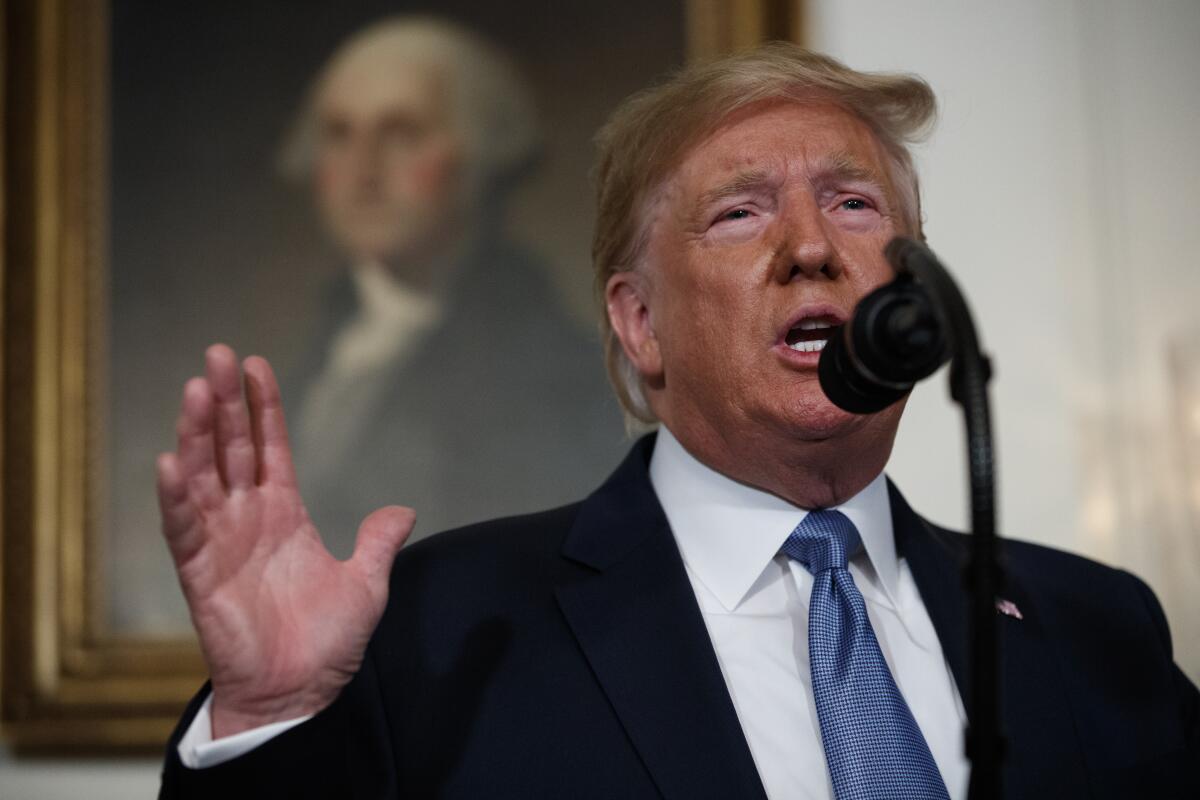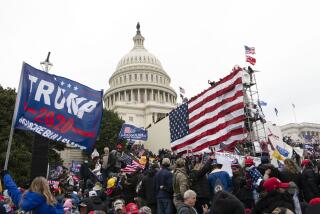Trump asks Supreme Court to shield his tax returns from investigators

- Share via
WASHINGTON — President Trump asked the Supreme Court on Thursday to shield him from a New York grand jury’s demand to see his tax returns and other financial records, setting the stage for a constitutional clash over whether the president has “absolute immunity” from being investigated or prosecuted.
It is the first of two appeals from Trump that seek to protect his tax returns from investigators. The House Oversight Committee has been seeking the same records, and on Wednesday, the full U.S. Circuit Court of Appeals in Washington refused to block the subpoena. Trump’s lawyers said they would appeal that case to the Supreme Court as well.
The justices are not required to hear Trump’s appeal or to decide the cases. But the pair of appeals when put together raise significant questions about the constitutional separation of powers and whether the president has a privacy right to shield his personal records from congressional investigators or state prosecutors.
If the justices vote to hear Trump’s plea, it could result in a major election-year ruling on whether a president is above the law while in office.
“We have filed a petition with the U.S. Supreme Court seeking to overturn the 2nd Circuit decision regarding a subpoena issued by the New York County district attorney,” said Jay Sekulow, counsel to the president. “The 2nd Circuit decision is wrong and should be reversed.”
The Supreme Court has never before said the president was immune or shielded from all investigations while in office. However, the Constitution says the president may be removed from office only through impeachment by the House and a conviction in the Senate.
The New York prosecutors who sought the tax returns are expected to file a response within 10 days. Meanwhile, Trump’s lawyers are expected to move quickly to appeal the ruling involving House investigators. The justices may take some time to decide on what to do.
The New York investigation does not concern Trump’s actions as president. Rather, Dist. Atty. Cyrus Vance Jr. is said to be investigating hush-money payments to two women who allege they had affairs with Trump. As part of its investigation, the grand jury sought eight years of the Trump Organization’s financial records from Mazars USA, its accounting firm, including Trump’s personal tax returns.
Even if the grand jury’s subpoena is upheld and Mazars complies with the order, it does not mean Trump’s tax returns will be made public. The grand jury operates under a rule of confidentiality.
Nonetheless, Trump’s lawyers went to federal court seeking to block the order while the president is in office. William Consovoy, a private attorney for Trump, relied on what he called a “temporary absolute presidential immunity.” In response to a question from one lower court judge, the attorney argued last month that Trump should be shielded from answering questions even if the president shot someone on Fifth Avenue in New York. During the campaign, Trump once famously said he was so popular among his base that he could shot someone on Fifth Avenue and not lose support.
In the filing Thursday, Consovoy said the court should decide whether the New York subpoena violates the Constitution. “There has been broad bipartisan agreement, for decades if not centuries, that a sitting president cannot be subjected to criminal proceedings.”
He said the subpoena essentially targeted Trump for criminal charges, even though it was sent as a request for documents to his accountants.
“This subpoena subjects the president to a criminal process under any reasonable understanding of the concept,” Consovoy said. “It demands the president’s records, names him as a target, and was issued as part of a grand jury proceeding that seeks to determine whether the president committed a state-law crime. That the grand jury subpoena was issued to a third-party custodian does not alter the calculus. If it did, every local prosecutor in the country could easily circumvent presidential immunity.”
A federal district judge and a three-judge panel of the U.S. 2nd Circuit Court of Appeals flatly rejected the claim of immunity. The judges pointed out that beginning with Thomas Jefferson in 1807, presidents have been required to respond to court orders seeking documents. In the most famous case, President Nixon was required by the Supreme Court in a unanimous 1974 decision to turn over to prosecutors his White House tape recordings.
President Clinton was required to answer questions under oath in response to a civil suit over a sexual harassment claim. He too had suffered unanimous defeat at the Supreme Court in 1997 when he sought to claim temporary immunity while in office.
Citing the example of Nixon’s Oval Office conversations, the 2nd Circuit Court said Trump and his lawyers failed to “explain why, if executive privilege did not preclude enforcement of the subpoena issued in Nixon, the Mazars subpoena must be enjoined despite seeking no privileged information and bearing no relation to the president’s performance of his official functions.”
Justice Department lawyers have long maintained that the president is not subject to criminal prosecution while in office. The Supreme Court has not ruled directly on that issue.
Chief Judge Robert Katzmann of the 2nd Circuit said the appeal in Trump vs. Vance raised a narrow issue. The grand jury’s subpoena does not compel the president “to attend court at a particular time or place, or … compel the president himself to do anything.” The order was directed at his accountants.
“We conclude only that presidential immunity does not bar enforcement of a state grand jury subpoena directing a third party to produce nonprivileged material, even when the subject matter under investigation pertains to the president,” Katzmann wrote on Nov. 4.
The House Oversight Committee has broad investigating authority. In February, it heard testimony from Michael Cohen, Trump’s former personal attorney, who said he believed the president “inflated his total assets” in some financial statements and “deflated his assets” at other times. The committee’s late chairman, Rep. Elijah E. Cummings, at first asked Mazars to furnish Trump’s financial records, including any regarding Deutsche Bank’s decision to reduce the interest rate on a $125-million Trump loan after he became a candidate for president.
When the accounting firm refused, Cummings issued a formal subpoena to Mazars in April seeking eight years of Trump’s financial records and tax returns. He said the committee was looking into whether Trump had “engaged in illegal conduct” before or during this time in office, had “undisclosed conflicts of interest” and had complied with the “Emoluments Clause of the Constitution,” which forbids officeholders from taking undisclosed gifts from foreigners.
Trump sued to block the subpoena, but lost before a federal judge and the D.C. Circuit Court of Appeals last month. Appeals court Judges David S. Tatel and Patricia A. Millett rejected Trump’s claim that the House subpoena should be blocked because it was allegedly aimed at law enforcement, not new legislation. They said Congress has always had broad power to investigate because these probes often reveal the need for new legislation. House Democrats were exploring for the need for new ethics and disclosure laws, they said. Tatel was appointed by Clinton and Millett by President Obama.
Judge Neomi Rao, a new Trump appointee, dissented. She said the majority “breaks new ground” by upholding a subpoena based on Congress’ “legislative power” even though it is “investigating allegations of illegal conduct against the president.” She suggested the demand for documents would have stood on stronger ground if it arose from an impeachment investigation.
“Allowing the committee to issue this subpoena for legislative purposes would turn Congress into a roving inquisition over a co-equal branch of government,” she wrote.
Trump’s lawyer asked the 11-member appeals court to reconsider the decision, but that request was turned down. Rao dissented, along with Judge Greg Katsas, a second new Trump appointee, and Judge Karen Henderson, an appointee of George H.W. Bush.
More to Read
Get the L.A. Times Politics newsletter
Deeply reported insights into legislation, politics and policy from Sacramento, Washington and beyond. In your inbox three times per week.
You may occasionally receive promotional content from the Los Angeles Times.











